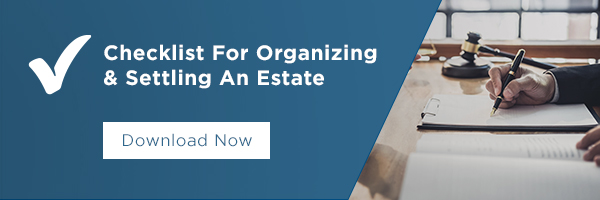The level of complexity involved with the transfer of wealth or assets can vary greatly depending on the decedent’s assets, the establishment of an estate plan or Will, whether the decedent has dependents who need to be cared for, the location of their assets or property, and plenty of other factors.
For heirs and executors who find themselves in this heartbreaking predicament, or for those who want to get ahead and make the process easier for their loved ones down the line, we have outlined the following steps to take when beginning the estate settlement process.
Three Important Steps for Organizing and Settling an Estate:
- Collect Important Information
The first step is to collect any and all documents that may contain information about the decedent’s assets and who is in charge of those assets, such as a will, trusts, and financial records, or any documents related to family business succession planning, to name a few. The more you can gather at the outset, the easier you’ll make it on yourself throughout the remainder of the estate settling process. Our Checklist for Organizing & Settling an Estate contains a comprehensive list of these documents. - Contact Fiduciaries
Should a financial institution or other personal fiduciary services company be named as co-executors, you can take comfort in knowing they will provide the extra guidance and resources as they carry out their fiduciary duty in helping you navigate this process.If the following parties aren’t already aware of the decedent’s passing, notify their Financial Advisor, Estate Attorney, Accountant, and other professionals with whom the decedent had a relationship/account. If the decedent does not have an existing relationship with these parties, consider consulting with these professionals, as they can provide clarity throughout the process, help you and your family save time and anguish, address beneficiary disputes, and avoid potentially costly pitfalls associated with settling an estate. - Notify Parties About the Decedent’s Death and Apply for Benefits
Determine which additional institutions, such as the Social Security Administration or the decedent’s pension administrator, employer, etc. must be notified of the decedent’s passing. Aside from carrying out the proper closing procedures, connect with these offices, agencies, and companies about moving forward with securing the appropriate benefits for you, your family, and additional beneficiaries.
Whether you’ve recently lost a loved one or are beginning to think about your plans for what you will pass on to your family, the process of organizing and settling an estate is an important one that can benefit greatly from the care and attention of a fiduciary. While our Checklist for Organizing & Settling an Estate is only the beginning, it will help you ensure you’ve gathered everything you need to take the next steps in honoring your loved one’s will and moving forward.

